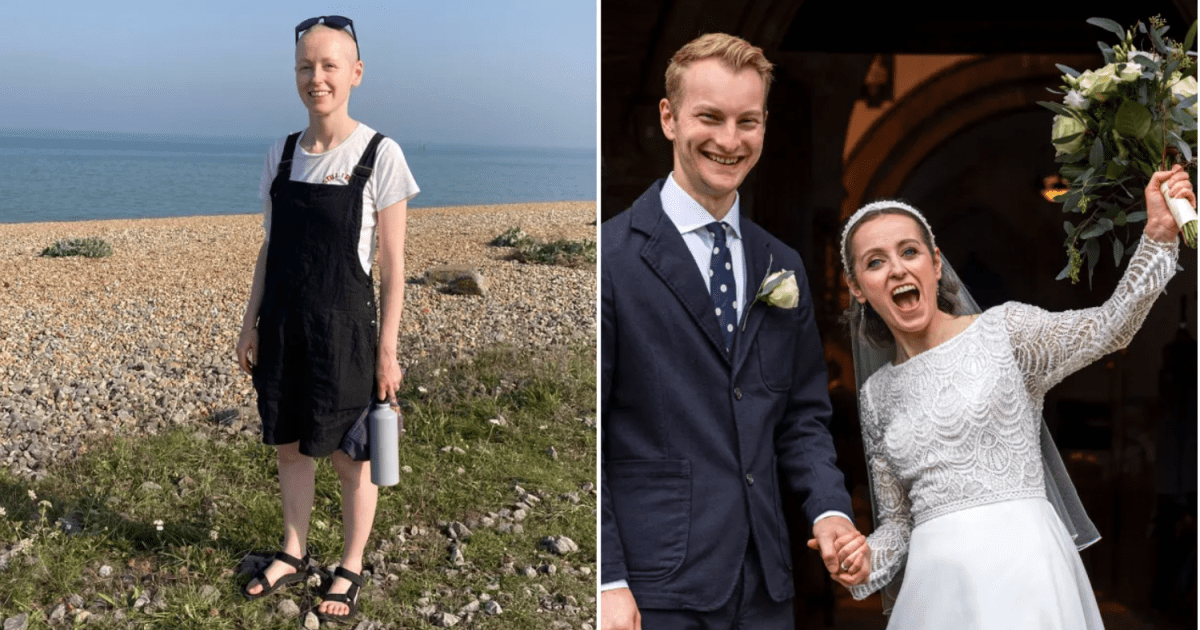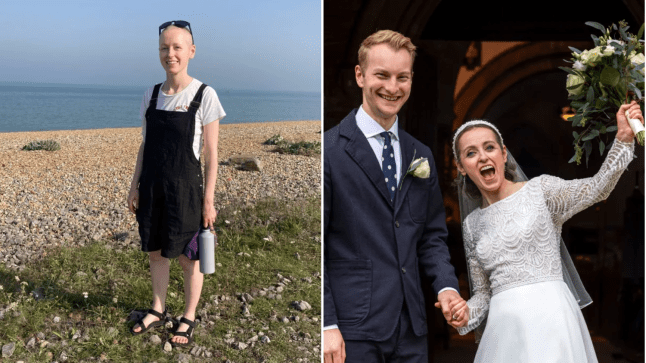
Moira Jordan had the BRCA gene mutation which made her more likely to get cancer (Picture: Moira Jordan)
In March 2023, Moira Jordan was in her wedding era. The bride-to-be had sent out the save the dates, booked the village hall, and said ‘yes’ to the dress.
When she wasn’t planning her nuptials to groom, Sam, 33, she was a busy geography teacher in South London, gearing up to get her students through exam season.
But Moira, now 32, was just four months away from her big day, when her life changed.
She received a diagnosis of triple positive breast cancer, and embarked on a gruelling health journey.
She tells Metro: ‘It was the hardest thing I’ve ever had to go through, without a doubt.
‘It was a very sad time, but I’m trying to have gratitude — both for the excellent care I received and for the amazing friends and family I was surrounded by.’
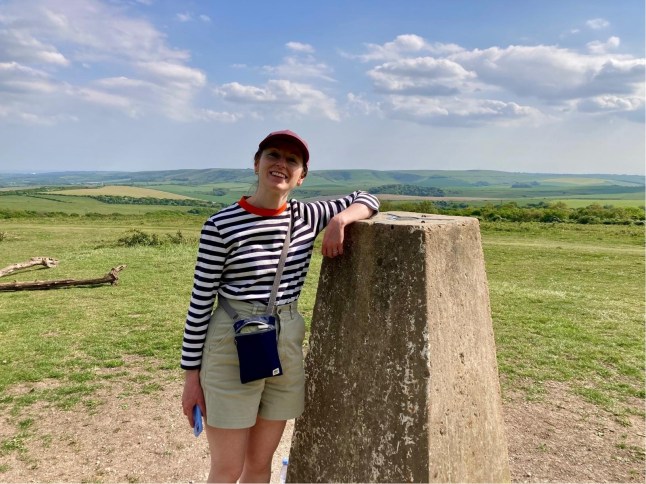
At the time of her diagnosis, geogrraphy teacher Moira was prepping students for exams (Picture: Moira Jordan)
Prior to her diagnosis, Moira was fit and healthy, but says that she was ‘breast aware’ due to a family history of cancer.
She explains: ‘My mum, Marian, was diagnosed with ovarian cancer in 2015, and a year later it was confirmed that I have the BRCA gene mutation.’
Everyone has BRCA1 and BRCA2 genes, but if the gene has changed in some way, it can increase the risk of certain types of cancers developing.
BRCA1 and BRCA2 gene variants can cause a much higher risk of breast and ovarian cancer.
Moira says: ‘I was only 24 when I found out, and the guidance is generally that the risk increases once you’re in your 30s.
‘I thought I could wait to go through any treatment until after I’d had a family.’
But, as Moira says, ‘the cancer caught up with me sooner than expected’.
‘I’m not sure when I first felt a thickening in my breast,’ she continues. ‘I think I thought it was just how my breast was, which seems so stupid now.
‘Eventually I went to the doctor, and two weeks later, I was in hospital for a scan and a biopsy.’
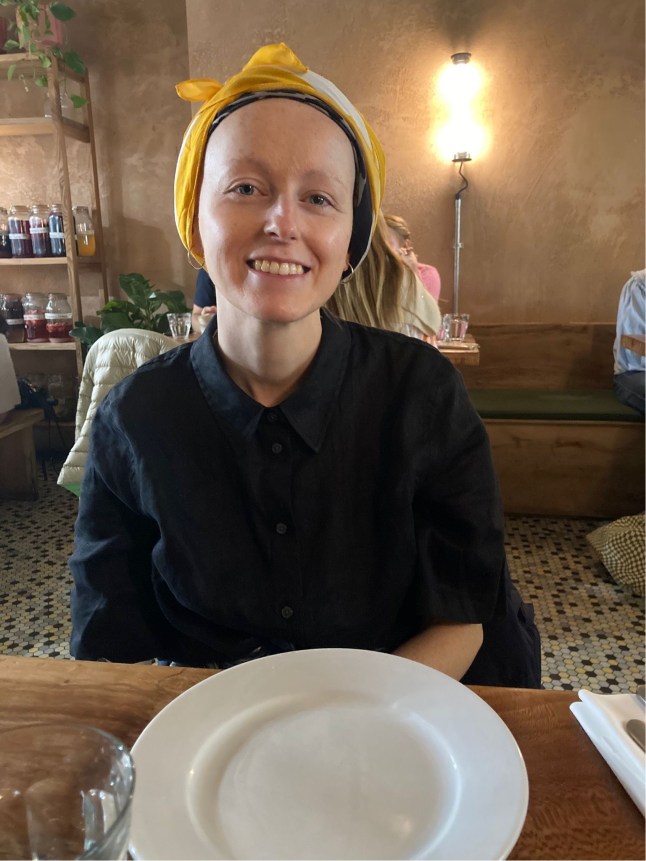
She underwent a gruelling treatment schedule (Picture: Moira Jordan)
While the doctors didn’t diagnose Moira there and then, she said there was a five-word tell-tell sign from the doctor.
Moira explains: ‘She said to me, “we’ll see you next week.’ And I just remember thinking, if everything was fine, they’d write to me or call. But clearly, they’d seen something and wanted to talk to me about it. It was then that I knew things were going to change.’
Moira’s suspicions were confirmed, when she was asked to return to hospital the following week.
‘I went alone,’ she says. ‘I went in with the nurse, and the doctor started speaking and he just said: “This is cancer”
‘My response was: “No, it’s not.” We actually went back and forth for a minute or two, with him confirming it was cancer, and me insisting that it wasn’t.
‘I just couldn’t get my head around it. It was a blur after that.’
In the weeks and months that followed, Moira embarked on a gruelling treatment plan.
After fertility treatment, she had eight rounds of intense chemotherapy, a double mastectomy and reconstruction, and 15 rounds of radiotherapy. The following year, she underwent a further 14 rounds of chemotherapy.
‘I tried to be positive,’ she says, ‘but it was a very, very low time. Most people my age were travelling, making memories, and starting their own families, while I was going through this.
‘I had to stop working, and the fatigue was terrible. As time passed, I just felt worse and worse.
‘Chemotherapy was particularly dark. I was so scared about catching coughs and colds that I just shut myself off.’
Moira and Sam were also forced to cancel their wedding. She says: ‘I called round friends and family, and obviously I had to explain what was going on.’
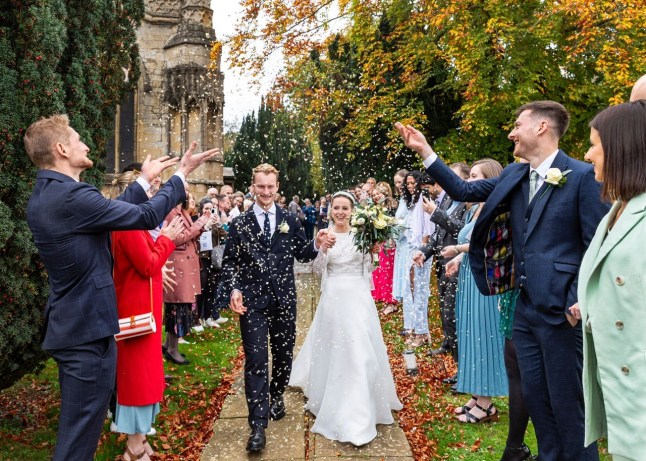
After initially cancelling their wedding, the pair were able to say ‘I do’ (Picture: Moira Jordan)
Thankfully, Moira’s treatment was a success, and after finishing radiotherapy, she began taking tablets to block oestrogen, as the hormone can make the cancer return. She’ll likely be on medication for the next five to 10 years.
And, after two years of constant hospital visits, Moira began rebuilding her physical and mental strength, attending physiotherapy at Guy’s Hospital, London, where she began running.
‘At that point I never believed I’d be capable of doing any kind of intensive exercise again. Spending so much time in hospitals meant I became quite reliant on others and totally lost both my independence and confidence. This was my chance to rebuild everything I lost.’
And finally, in October 2024, Moira and Sam were able to walk up the aisle.
She says: ‘We did it all pretty last minute. We only sent the invites out eight weeks before.
‘I really wanted it to be a day where I didn’t feel sad, so I tried to keep the cancer out of it. It was a wonderful day.’
Now, Moira is preparing to run the Royal Parks Half Marathon alongside 16,000 people on Sunday October 12 in support of CoppaFeel – the UK’s only youth-focused breast cancer charity – as part of her mission to raise awareness and empower more young people to be aware of changes in their body.
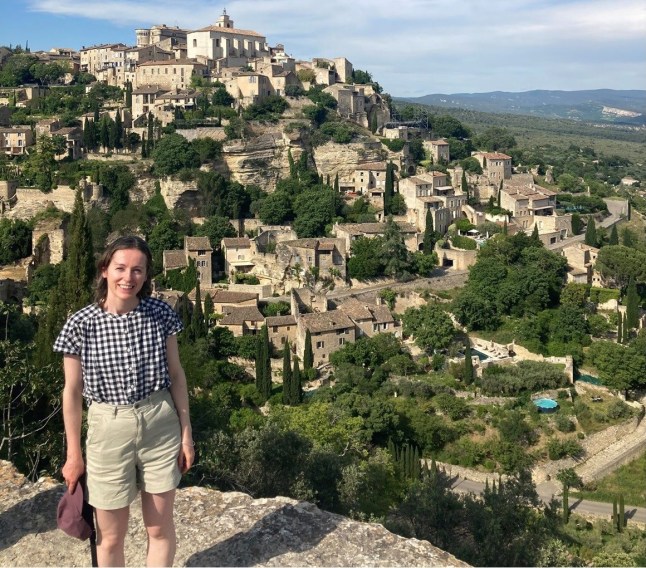
After her cancer journey, Moira has been able to take up running and go travelling (Picture: Moira Jordan)
She’s particularly passionate about making breast cancer education a standard part of school life, ensuring that every young person leaves the education system knowing how to check their body, recognise what’s normal, and seek help if something changes.
Looking ahead to race-day, Moira said: ‘This race will mark just over two years since my surgery. It’s the latest in a series of opportunities I never thought I’d have.’
When asked what advice she would give to someone going through something similar, Moira said: ‘Try and make small daily goals and simply focus on getting by at first. Don’t think about what you can’t do, but about what you can do.’
Now, reflecting on her goals for race-day and beyond, Moira says: ‘I simply want to raise awareness on the importance of young people regularly checking on their own health and wellbeing.
‘Having been diagnosed at a young age myself, this mission feels more important to me than ever.’
To donate to CoppaFeel! visit Moira’s fundraising page, go to: Moira’s fundraising page.
Do you have a story to share?
Get in touch by emailing MetroLifestyleTeam@Metro.co.uk.
Arrow
MORE: I saw the aftermath of my teenage daughter’s party – and smiled
Arrow
MORE: My date was perfect until he said dinosaurs weren’t real
Arrow
MORE: I had a tummy tuck when I was pregnant with my fourth baby
Comments
The Slice
Your free newsletter guide to the best London has on offer, from drinks deals to restaurant reviews.
